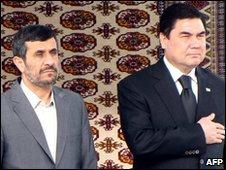The dictator's dilemma: To win with 95 percent or 99?
In today's world, even the most blatantly undemocratic governments feel the need to hold periodic elections to reaffirm their legitimacy. But I'm always interested by the final numbers in elections where there's absolutely no question of who will win. The 90 percent mark seems to be a useful line to distinguish between the authoritarian governments that care about the international perception of their elections and want to present the appearance of having an opposition, and those that care only about demonstrating their absolute control to their own citizens.
While neither is a democratic contest, there is a difference -- in intended effect at least -- between Hosni Mubarak getting 88.6 percent of the vote in 2005 and Bashar al-Assad getting 97.62 percent in a “presidential referendum,” with no opposition candidates, as he did in 2007. Then there’s the 99 percent club, which includes the Castro brothers, and Kim Jong Il. Saddam Hussein went for the full 100 percent in 2002, but then again, he was overthrown a year later. (Why a dictator decides between winning by 97 percent or 99 percent isn't quite clear.)
In general, when a former 90-percenter start slipping below that mark – as Mubarak did in 2005 -- it’s not a good sign for the future of the regime. The Communist Party of the Soviet Union won 100 percent in every legislative election until 1984, when the party, led by General Secretary Konstantin Chernenko, won 71.5 percent, with the rest going to handpicked “independents.” Seven years later the Communists were done.
Today's Russia is something of a hybrid. In the last legislative elections, the ruling United Russia party took 64.3 percent of the vote nationwide, the kind of number you see in an authoritarian country that feels the need to demonstrate that it has at least a token opposition. (Iran, for instance.) But in Chechnya, United Russia took a Turkmenistan-like 99.48 percent of the vote with 99.5 percent turnout -- quite a show of support in a republic that recently saw a bloody nationalist uprising against Moscow.
Another related question: what’s the most lopsided victory in a national election generally considered democratic? Jacques Chirac beat Jean-Marie Le Pen with 82.21 percent of the vote in 2002 French presidential election, but that was a run-off after he had failed to break 20 percent in the first round. Same with Lech Walesa’s 74.3 percent in Poland’s first democratic election.
The winner among current democratic leaders – readers please correct me if I’m wrong – might be South Africa’s Jacob Zuma, who took 65.9 percent of the popular vote in 2009. This is slightly less than Nelson Mandela won in 1994, the first year black South Africans were allowed to vote.
The numbers can often be a bit lopsided in new democracies. India’s Congress Party, led by Jawaharlal Nehru, won 44.99 percent of the vote in India’s 1951 election, compared to only 3.29 percent for the second-place party.
In the first two U.S. presidential elections, George Washington ran unopposed and took 100 percent of the vote. James Madison also ran unopposed in 1820. The most lopsided contested presidential election in U.S. history was Thomas Jefferson’s victory over Charles Cotesworth Pinckney in 1804. With a bit over 72 percent of the popular vote, (electors were chosen by state legislatures in 6 of the 17 states at that time), the author of the Declaration of Independence won with a higher percentage than Vladimir Putin or Mahmoud Ahmadinejad have ever managed to muster.
Question for readers: Has any national candidate ever won over 90 percent in a first-round election against real opposition without cheating? 80 percent?
Update: Several readers suggest the 2004 post-Rose Revolution Georgian presidential election in which Mikheil Saakashvili won 96 percent of the vote. The vote got a mostly clean bill of health from the OSCE.
By Joshua Keating

